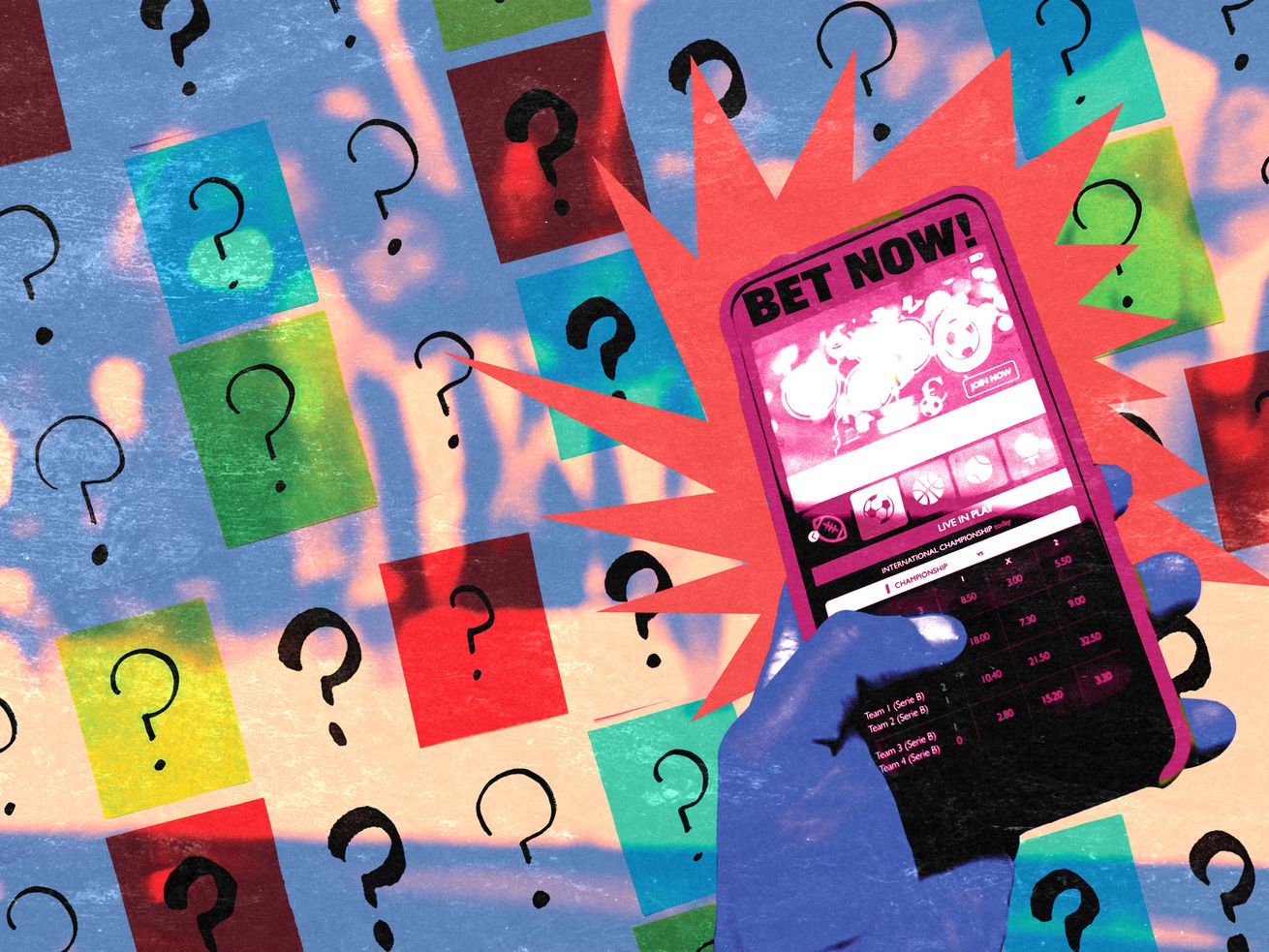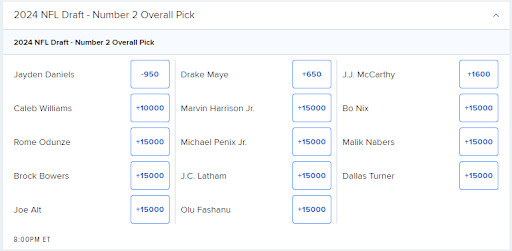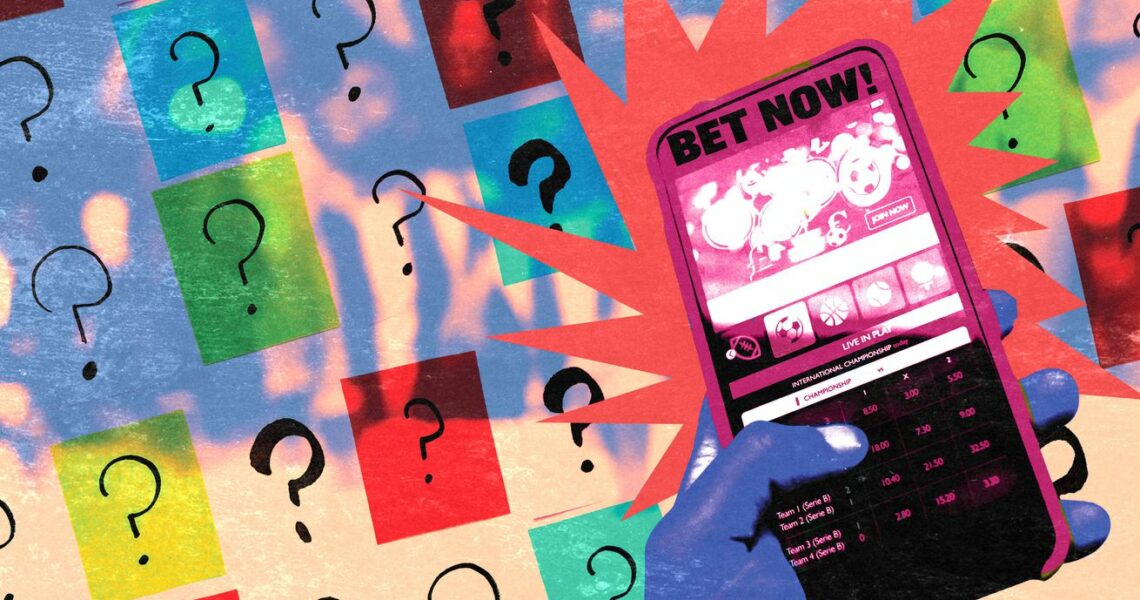
Draft intel is in scarce supply. When a line moves dramatically in a draft market, it’s rarely because an oddsmaker has inside information. They’re just as gullible as the rest of us.
The legalization of sports gambling has dramatically changed how fans consume football. Al Michaels’s not-so-subtle acknowledgements when a late play would flip the point spread or push the total over, long a treasured and cheeky toeing of the line, now feel mundane. Almost every major sports league has a partnership with a sportsbook (or two, or three). Betting segments populate pregame shows, with analysis not just on lines and totals, but specific player props as well. Some of our podcasts here at The Ringer are brought to you by FanDuel Sportsbook—I should know, I’ve read their ads a thousand times. Betting on sports has become an inexorable part of how we consume sports.
This shift has trickled to the NFL draft, where you can bet on anything from Kool-Aid McKinstry’s draft slot (current over/under: 28.5) to the position of the first player selected by the Cleveland Browns (current favorite: defensive line/edge at +170) to the exact player to go ninth overall (Byron Murphy, +170) to who the second tight end selected will be (Ben Sinnott, +175). Just five years ago, the likelihood that a certain team would pick a certain player could only be riddled out from the exact wording used by a few league insiders. Today, we can replace our Twitter-powered crystal ball with cold, hard numbers backed by cash. How likely is Jayden Daniels to go second overall? At press time, his odds stand at -950. That’s an implied 90 percent chance.
But anyone who has dropped $5 on the Chiefs to beat the Bills, and another $5 on the Patriots to draft J.J. McCarthy, will notice something quickly: NFL draft markets don’t behave like the markets on NFL games. Not at all.
Rewind the clock one year. It’s the week of the 2023 draft, and Alabama quarterback Bryce Young is definitely, absolutely, no question, for sure, going to be the first overall pick. Earlier in April, that wasn’t certain—Ohio State QB C.J. Stroud was the favorite (-333, an implied 77 percent chance)—but by draft week, the Panthers’ intentions had apparently leaked, and Bryce Young’s name was written in stone. Sportsbooks were sure—to the tune of -2000 odds—that Young was going to be a Panther.
Then, two days before the draft, Kentucky QB Will Levis made that stone crack. Just a little, but enough. Levis’s odds to be the first overall selection went from +4000 to +400—a movement from 2 percent to 20 percent.
Could the Panthers really be doubting themselves at the 11th hour? Had every national and local reporter been duped? Was ownership stepping in and taking control of the draft room?
Or was everyone just overreacting to a Reddit post—yes, a Reddit post—from an anonymous account claiming that Levis was telling friends and family that he was going to be the first pick?
The NFL Draft in 2023: pic.twitter.com/RUGhhxVnpm
— Ari Meirov (@MySportsUpdate) April 25, 2023
Three sentences from u/SaleAgreeable2834 was apparently all that was needed to make markets fly. At the beginning of the day, a $10 bet on Levis to go first would have made you $400 if it hit—by the afternoon, the same bet would have made you $40.
Only that wasn’t it! Just days before, Levis had overtaken Stroud to be the second overall pick to the Houston Texans—his odds at BetMGM sat at -145 just four days before the draft began.
And that’s not all! Just days before that, Levis was the favorite to go fourth overall to the Indianapolis Colts.
Who will be the 4th pick in the NFL Draft? pic.twitter.com/iHkrEZRgVy
— BetMGM (@BetMGM) April 20, 2023
And where did Levis end up going? Not first, as that anonymous Redditor—who had never posted before and has not posted since—promised. Not second, where he’d been steadily climbing as the favorite over Stroud. Not fourth, where he was a favorite over Florida QB Anthony Richardson until the moment the pick was announced. He went 33rd overall. Not even in the first round.
What happened with Levis last year does not happen with NFL games. When the Chiefs open as a 3-point favorite over the Bills, they don’t suddenly become a 9-point favorite because someone on Reddit thinks Patrick Mahomes is a winner. And Kansas City doesn’t subsequently stumble so hard that they lose by 50.
So while betting on the NFL draft may scratch the same itch for an enterprising fan that betting on NFL games does—chasing a gut feeling, sending screenshots of long shots in the group chat, rooting for Your Guys—it’s important to understand that the two events are not similar at all. And if Vegas is pretty much unbeatable in standard NFL games … does that mean they’re beatable when it comes to the NFL draft?
I spoke to Jeffrey Benson, the director of operations at Circa Sportsbook, about the difference between setting a line for an NFL game as opposed to one for a player in the NFL draft. “If you have any semblance of an idea of what you’re doing, the worst that you’re going to do is open the Titans -1.5 when the market maybe hangs -3,” he said. “Maybe you open 46 (on the total) when the market hangs 48. It’d be pretty hard, if you follow the sport, and you’ve been doing this for a long time, where you open a point spread that’s 20 points off.”
It’s not just that books have been setting lines for NFL games for a long time—it’s that they have a computer to help them do it. There are enough metrics out there to create solid power rankings and produce reasonable lines for any matchup. Adjustments are made—maybe the Chiefs have been traveling for three straight weeks, or the Bills are missing key starters. That’s where the experience comes in to set a number that is fine-tuned and relatively stable.
Draft markets behave in exactly the opposite way. Initial lines are created not by an algorithmic recommendation, but by heuristic musing. As Nick Bogdanovich, who was in charge of setting the lines for Circa’s 2023 NFL draft markets, said last year: “You’re listening to every podcast you can, watching TV and scouring the internet for information. I compiled 10 or 11 mock drafts from respectable people and used that to try to come up with a good number.”
Because there is so little to go off of, those lines are not posted with the expectation that they’re correct—rather, books know that those lines will get hammered by sharp bettors. Sharp bettors are those bettors who are reliably profitable, but there’s an enormous difference between a sharp bettor on NFL action—one who is good at picking winners in NFL games, likely with a data-based edge or a reliable system—and a sharp bettor in the NFL draft market. The latter is usually someone who is informed. While having a source with an NFL team can give you a bit of an edge in an NFL game—imagine someone who knows the severity of a Jalen Hurts injury before the public does—it gives you a much greater edge in the NFL draft market.
Those sharp NFL draft bettors inundate the market with money, and the lines fly accordingly. Benson used Jer’Zhan Newton, the Illinois defensive tackle, as an example of how rapidly Circa responds to money in the NFL draft market. Circa initially opened Newton’s draft position at 17.5. Within minutes of posting, they brought Newton’s number all the way up to 32.5. “What I don’t think people realize, when somebody sees Newton go from 17 to 32, they’re like ‘Oh my God, they took 25 steps to get there.’ That’s not really the reality … the first two bets may have been on Newton, and he goes from 17.5 to 22.5. The next two bets are on Newton, he goes from 22.5 to 27.5. The next two bets are on Newton, now he’s at 32.5, and we’re writing two-way action.”
By “writing two-way action,” Benson means they’re starting to take bets on Newton’s under and on Newton’s over—and that’s where sportsbooks want to be in the NFL draft markets. It’s hard, if not impossible, to get 50 percent of the money on a player’s over, and 50 percent on the under—especially in the case of a player like Newton, whose line moved so much. But eventually, the books want those lines to reach a place of homeostasis, where they’re taking about as many tickets on the under as they are on the over.
This works for a player’s over/under market, which is a simple two-way market, much like an NFL point spread is—but what about something a bit more complex, like that pesky second-overall market which had Levis and Stroud and Will Anderson Jr. and Tyree Wilson listed? Those markets with tons of potential winners—which Benson calls “index markets”—react even more quickly to incoming money. It’s one thing for a sportsbook to pay out on posting a bad Newton line, where most winners pay out at around -110 (a $110 bet wins $100 for the bettor). If you’re lucky, maybe you’re snagging a payout around +150, but that’s about as high as they get. It’s much riskier for a sportsbook to hang a bad line on an index market, where a bettor might be able to wager at +300 or +400 or higher, and a winning $110 bet is paying out $330 or $440 to the bettor.
Look at the current odds on Fanduel Sportsbook for this year’s second pick. Jayden Daniels is a bigger favorite right now than he’s ever been on the book.

But what if, just as you’re reading this, someone with a huge account comes in and drops $10,000 on Drake Maye at +650? No Adam Schefter report. No history from this account at dominating in the NFL draft. The book will now pay a whopping $65,000 to that bettor if they’re right. And in a market with no algorithms, no computer-generated line that historically sets a fair price—in a market based on just information, and not very much of it—that $10,000-sized nugget can weigh as heavily as Schefter’s musings or u/SaleAgreeable2834’s post. The book has to move on that information now.
That’s how markets like Will Levis’s last season get out of hand. Like most of us who aren’t employed at the highest levels of NFL front offices, sportsbooks are flying blind in the NFL draft. They jump at every shadow of new information, desperate to not be the book on the market with the worst Levis line or Maye line. They’ve been hammered too many times on these exact markets. In the 2022 NFL draft, Georgia edge rusher Travon Walker was a substantial underdog to be the first overall pick, and books took a bath when the public figured out that the Jaguars were targeting him with the top selection. In the 2022 NBA draft, the Orlando Magic pulled a late stunner when they took Paolo Banchero with the top overall pick over Jabari Smith Jr., and books got hammered on that as well.
Paolo Banchero’s odds to be 1st Pick in #NBADraft at @BetMGM
Sunday: +1600
Monday: +900
Tuesday: +225
Wednesday: +200
Thursday morning: Off the board
Reopen +200— John Ewing (@johnewing) June 24, 2022
At this point, Circa does not offer index markets on the NFL draft, and they don’t even offer bets on any other drafts besides that of the NFL. And despite the fact that they’ve passed on these specific markets, Circa still expects to lose money. “It’s a loss leader,” Benson tells me. “But it’s something that we do because it’s the biggest league in the world, and there’s an expectation that we’re going to offer it.” Reflecting on the Banchero fiasco for Fox Sports, Tieme Wesselink, a trader for the now defunct Fox Bet, made much of the same observation. “Generally, books, including ours, see more red numbers than green numbers on draft wagering for NFL, NBA, NHL. We still love to continue to offer draft betting as it is a great way to build stories around the draft and to keep customers engaged in the sport during the offseason.”
Of course, books aren’t in the business of losing money. From removing some markets to putting limits on bet sizes, sportsbooks are trying to find ways to still post the NFL draft and keep you engaged in the offseason, but without too large of an expense to their wallets. Another way to do that? Move even faster to new information. React more explosively to every new scrap of intel. Never, ever, be caught hanging a stale line that the public can take advantage of.
In this way, there’s a cognitive dissonance between the public’s view on a sportsbook’s draft lines, and the way the book views it internally. When Levis suddenly becomes the favorite to go second or fourth overall, the public wonders if the sportsbook knows something. But the sportsbooks aren’t trying to know anything, really. They aren’t so much trying to outsmart the public as they are trying to reflect what the public believes—whatever the money believes. And while you’re there, pawing through odds for J.J. McCarthy to go second overall or Rome Odunze to be the pick for the Bears at no. 9, they’re hoping you drop a few dollars on the Celtics to cover, as well.
So there is no wisdom of the sportsbook in April—no “Vegas is always right,” as we often parrot during the season, when the public hammers a Week 9 line that inevitably fails to cover. Instead, the sportsbook becomes no different than any bettor who saw a Redditor say they’ve heard that a prospect is telling friends and family that he’ll be the no. 1 pick. It’s lying season, and sportsbooks are just as gullible as the rest of us.

